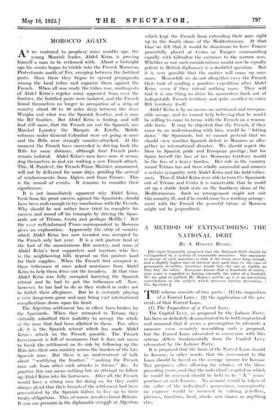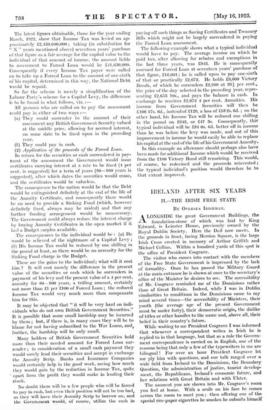A METHOD OF E XTI NG LTIS I I IN(
THE NATIONAL DEBT
By A. HER vEr HoiliE.
[We have frequently proposed that the National Debt should bo extinguished by a system of terminable annuities. Our argument in favour of such annuities is that if the term were long enough, and a slightly higher rate of interest were paid tha7 in the case of permanent securities, investors would buy the one as readily as they buy the other. Everyone knows that a leasehold of ninety- nine years is regarded as having virtually the value of a freehold. We are glad to publish Mr. Hoare's article, as it is an interesting contribution to the subject which deserves further discussion, En. Sretator.] THE scheme consists of two parts : (1) the imposition of a Forced Loan ; (2) the application of the pro• ceeds of that Forced Loan. .
(1) The Imposition of a Forced Loan.
The Capital Levy, as Proposed by the Labour Party, has been so definitely demonstrated to be both impractical and unsound that it seems a presumption to advocate a measure even remotely resembling such a proposal, but the Forced Loan advocated in connexion with this scheme differs fundamentally front the Capital Levy advocated by the Labour Party.
It is proposed that the basis of the Forted Loan should be Income, in -other words, that the assessment to the - Loan should be based on the average income for Income Tax purposes, after allowing for rebates, of the three preceding years, and that the individual's capital on which he would be assessed should be held to be " X " years' purchase of such laconic. No account would be taken of the value of the individual's possessions, consequently no expense would be incurred in valuing jewellery, • pictures, furniture, land, stocks and shares or anything else. The latest figures obtainable, those for the year ending March, 1922, show that Income Tax was levied on ap- proximately £2,450,000,000 ; taking (in substitution for " X " years mentioned above) seventeen years' purchase of that figure as a fair average for the capital value to the individual of that amount of income, the amount liable to assessment to Forced Loan would be £41,650,000. Consequently if every Income Tax payer were called on to take up a Forced Loan to the amount of one-sixth of his capital, determined in this way, the National Debt would be repaid.
So far the scheme is merely a simplification of the Labour Party's scheme for a Capital Levy, the difference is to be found in what follows, viz. :— All persons who are called on to pay the assessment could pay in either of two ways :- (a) They could surrender to the amount of their assessment any British Government Security valued at the middle price, allowing for accrued interest, on some date to be fixed upon in the preceding year.
(b) They could pay in cash.
(2) Application of the proceeds of the Forced Loan.
In return for the securities or cash surrendered in pay- ment of the assessment the Government would issue certificates carrying interest at a rate to be fixed (4 per cent. is suggested) for a term of years (80-100 years is suggested), after which dates the annuities would cease, and the certificates would be valueless.
The consequence to the nation would be that the Debt would be extinguished definitely at the end of the life of the Annuity Certificate, and consequently there would be no need to provide a Sinking Fund (which, however definitely fixed, always may be raided) and that any further funding arrangement would be imnecessary. The Government could always reduce the interest charge by buying Annuity Certificates in the open market if it had a Budget surplus available.
The consequences to the individual would be : (a) He would be relieved of the nightmare of a Capital Levy ; (b) His Income Tax could be reduced by one shilling in the pound at least, as there would be no necessity for the Sinking Fund charge in the Budget.
These are the gains to the individual; what will it cost him ? It will cost merely the difference in the present value of the securities or cash which he surrenders in payment of his levy and the present value of a 4 per cent. annuity for 80-100 years, a trifling amount, certainly not more than £1 per £100 of Forced Loan ; the reduced Income Tax would very much more than compensate him for this.
It may be objected that " it will be very hard on indi- viduals who do not own British Government Securities." It is possible that some small hardship may be incurred by them ; but, if there is, in many cases they will be to blame for not having subscribed to the War Loans, and, further, the hardship will be only small.
Many holders of British Government Securities hold more than their needed amount for Forced Loan sur- render ; in consideration of a small cash payment they would surely lend their securities and accept in exchange the Annuity Scrip. Banks and Insurance Companies would certainly help in the good work, seeing how much they would gain by the reduction in Income Tax, quite apart from the profit they would make in lending their stock.
No doubt there will be a few people who will be forced to pay in cash, but even their position will not be too bad, as they will have their Annuity Scrip to borrow on, and the Government would, of course, utilize the cash .in paying off such things as Saving Certificates and Treasury Bills which might not be largely surrendered in paying the Forced Loan assessment.
The following example shows what a typical individual would have to pay. The average income on which he paid tax, after allowing for rebates and exemptions in the last three years, was £943. He is consequently assessed for Forced Loan at seventeen years' purchase of that figure, £16,031; he is called upon to pay one-sixth of that or practically £2,672. He holds £3,000 Victory Bonds, of which he surrenders £2,900 at 911- per cent.; the price of the day selected in the preceding year, repre- senting £2,653 10s., and pays the balance in cash. In exchange he receives £2,672 4 per cent. Annuities. His income from Government Securities will then be £106 17s. 6d., instead of £120, a loss of £13 2s. 6d. ; on the other hand, his Income Tax will be reduced one shilling in the pound on £943, or £47 3s. Consequently, this typical individual will be £34 Os. 6d. better off in income than he was before the levy was made, and out of this improvement in income he would easily be able to replace his capital at the end of the life of his Government Annuity.
In this example an allowance should perhaps also have been made for additional Income which would be received from the £100 Victory Bond still remaining. This would, of course, be redeemed and the proceeds reinvested ; the typical individual's position would therefore be to that extent improved.











































 Previous page
Previous page